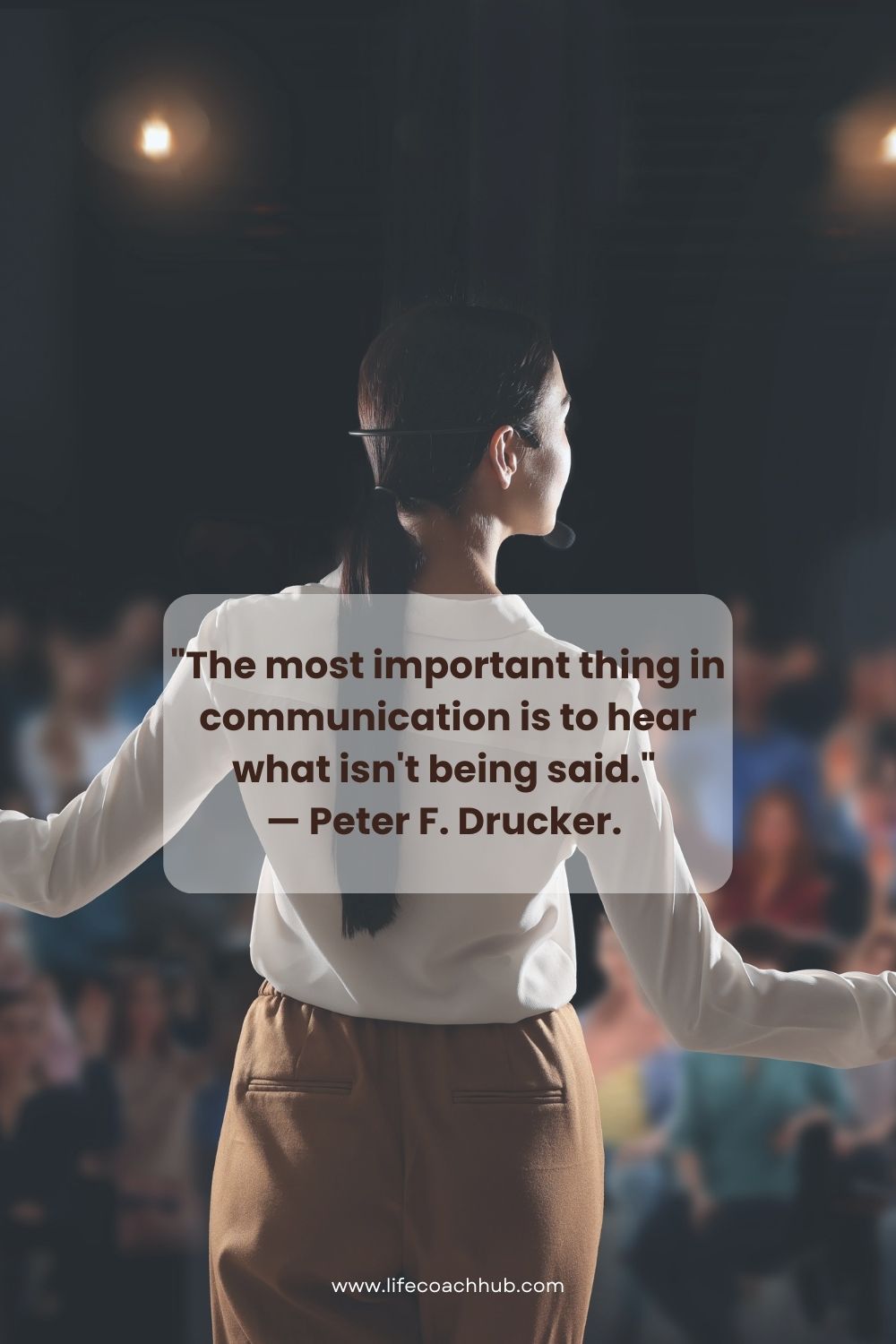Communication connects people together. It's how we share meanings with other people. While innate, it's an ability that often needs working on. A communication coach specializes in helping individuals or groups improve their communication skills. These coaches work across various domains. This includes personal relationships, public speaking, leadership, and many more. Their primary goal is to enhance their clients' ability to effectively convey ideas, emotions, and information. All the while fostering better understanding and relationships.
Communication is transactional.
It involves two or more people constructing meaning together (Fielding, 2006). They are mutually responsible for the outcome. The focus revolves around the quality of relationships that will develop later on.
Words alone do nothing. It's up to us to give meaning to them. More so, it's our responsibility to transfer and interpret those messages correctly.
And still, the same words that one person utters may hold different meanings for different people. How inconvenient can that be?
This is where effective communication comes in. It demands that people work together. This way, a similar meaning is created for everyone.
Unfortunately, this can prove difficult from time to time. A communication coach does help.
By a lot. Some of their roles include the following:
There's always room for improvement, as they say. Your communication skills aren't exempt from that.
Communication coaches begin by assessing their clients' communication skills and abilities. This often involves analyzing various aspects of communication. Here, we have verbal and non-verbal cues, listening skills, and the ability to convey messages clearly and effectively.
They also use self-assessment tools and quizzes designed to evaluate communication skills. These tools can provide a structured way to identify areas for development.
Your coach might also suggest identifying people known for their excellent communication skills. Your task? To observe how they speak, listen, and interact with others. With that, you can analyze what makes their communication effective. You can emulate those aspects.
Once the objectives are clear, your communication coach will design a customized plan. This will involve strategies and exercises to address your specific challenges. Specifically, you'll have access to role-playing scenarios and speech practice. Mindfulness techniques to reduce anxiety are surely on the table as well.
Role-playing is a powerful technique in communication coaching. It involves simulating real-life scenarios in a safe, controlled environment. You and your coach take on different roles within the scenario. For example, you'll negotiate, and your coach will be the prospective business partner. The more realistic the scenario, the better practice it is for you.
Additionally, having a coach provides a level of accountability. It's a highly motivating thought. Knowing that you have scheduled coaching sessions. The fact that someone is invested in your progress. These are all encouraging. And chances are, you'll stay more committed to your communication goals.
Your coach can even assist you in preparing speeches or presentations. This includes structuring content, developing key messages, and creating engaging visuals. If need be, you can practice delivering your speech multiple times. Your coach can provide pointers on voice modulation, body language, and delivery.
Whether it's public speaking, negotiation, conflict resolution, or interpersonal communication, improvement is always a vulnerable process. Such vulnerability arises from the fear of making mistakes. The very thought of judgment?! Facing rejection?!!
But worry not. A safe environment allows you to experiment with new communication techniques. Freely learn communication skills without the fear of negative consequences. This is crucial for stepping out of your comfort zone. You're a session away from discovering new and potentially more effective approaches.
In a safe environment, you're likely more pliant to take risks. As you experience success and growth within a safe space, your self-esteem and self-confidence naturally improve, too.
But a safe environment isn't possible without your trust. It is, after all, the foundation of that safe space. You need to trust that your coach only has your best interests at heart. Confidentiality won't be an issue.
Communication isn't just sewn with words. It involves many human activities. Basic activities like creating images, listening, reading, speaking, viewing, and writing (Mooij, 2013). It may be something we know naturally, but doing it effectively? It's a skill that needs fine-tuning.
You need a communication coach if you're:
Of course, needing a communication coach isn't only limited to these. Let's expound more on why you need one:
People negotiate all the time. It's something that all of us use in various aspects of our lives. In essence, it helps us become closer to our goals.
Negotiations are especially prominent in business transactions. You'll want to reach a deal that is always to your advantage. In business roles, your inability to negotiate results in lost opportunities. For instance, you might struggle to close deals. So, you start losing potential clients or partnerships to competitors who negotiate better.
A communication coach can assist you in developing negotiation strategies. You can set clear objectives. You get to understand the other party's perspective. And! You'll know to expect potential objections or obstacles.
As for personal relationships, negotiation skills are vital for resolving conflicts. Then there's the joint decision-making while maintaining healthy dynamics. Lacking these skills can result in strained relationships.
Effective leaders are skilled listeners. They make employees feel heard and valued. This boosts morale and fosters a positive work environment. Without active listening, leadership can feel distant and disconnected.
It involves fully engaging with the person you're talking to, no matter their rank. An effective leader understands each of their team's messages. You have to provide feedback to confirm understanding.
This skill is invaluable. It fosters trust, empathy, and stronger connections in your workplace. And quite frankly, all areas of your life!
Just because you're on the supervisory or managerial level now doesn't mean you do all the talking. It helps if you also understand each other's feelings, needs, and perspectives. Without it, conflicts may escalate due to misunderstandings.
Your communication coach helps you align your communication style with your leadership style. This ensures consistency in conveying your intent.
Strong presentation skills encompass your ability to engage, inform, and persuade. Other than the obvious, that is speaking fluently in front of an audience.
In the corporate world, giving presentations is a definite part of the job. Whether it's pitching to clients, presenting proposals to colleagues, or addressing senior management. Effective presentation skills enhance your professionalism and credibility.
Those who can articulate their ideas clearly and persuasively are more likely to stand out. A well-delivered presentation can lead to promotions, leadership roles, and increased responsibility.
Effective presentations involve other factors aside from words. I think we can all agree that monotonous words are a snooze fest waiting to happen. You and your communication coach can work on non-verbal elements. Your body language, tone, and pacing to convey your message effectively. The works.
Your coach can help with presentation skills extending beyond any formal business setting. All in all, it benefits your everyday life and personal relationships.
 India
$20 -
$60 USD
Contact me
India
$20 -
$60 USD
Contact me
I am a certified life coach I’m here to accompany you through your journey
 United States
$45 -
$500 USD
Contact me
United States
$45 -
$500 USD
Contact me
I know how to get things done. I know how to succeed goals, with real practical methods.
 United States
$50 -
$100 USD
Contact me
United States
$50 -
$100 USD
Contact me
Jungian Coach / Career coach Life Coach / Empowerment Coach / Archetypal Coach
 United States
$75 -
$3500 USD
Contact me
United States
$75 -
$3500 USD
Contact me
I'm an evidence-based coach helping clients with their communication, leadership skills, anxiety and
 United States
$75 -
$150 USD
Contact me
United States
$75 -
$150 USD
Contact me
A Motivational/Growth&Communication Life coach who can help 'unstick,stir & spur' you to movement!
 United States
$30 -
$7800 USD
Contact me
United States
$30 -
$7800 USD
Contact me
Get unstuck. Get clear. Get going. Get results. I help you get out of your own way.
 United States
$200 -
$11999 USD
Contact me
United States
$200 -
$11999 USD
Contact me
Business & Life Coaching for Physicians and Attorneys
 United States
$65 -
$150 USD
Contact me
United States
$65 -
$150 USD
Contact me
I am outgoing, serious about helping others and an excellent communicator.
 United States
$100 -
$4500 USD
Contact me
United States
$100 -
$4500 USD
Contact me

Hi this is Michelle the owner of 1 Life Coaching. I look forward to working with you!

Efficiency expert with a professional background in organizational leadership and 1:1 trainings.

Refreshingly pragmatic coaching service. Helping small business & individuals, team coaching
 United States
$100 -
$1600 USD
Contact me
United States
$100 -
$1600 USD
Contact me
Specializing in Relationships, Loving Communication, Personal Growth, and Spirituality


Is there something within you that wants to be realised? Find the best path to your best life

Life is an adventure that is always worth the work!


Nicole is passionate about seeing every individual that works with Coaches 4 Life achieve success!
Get matched to an expert coach and book a free consultation.
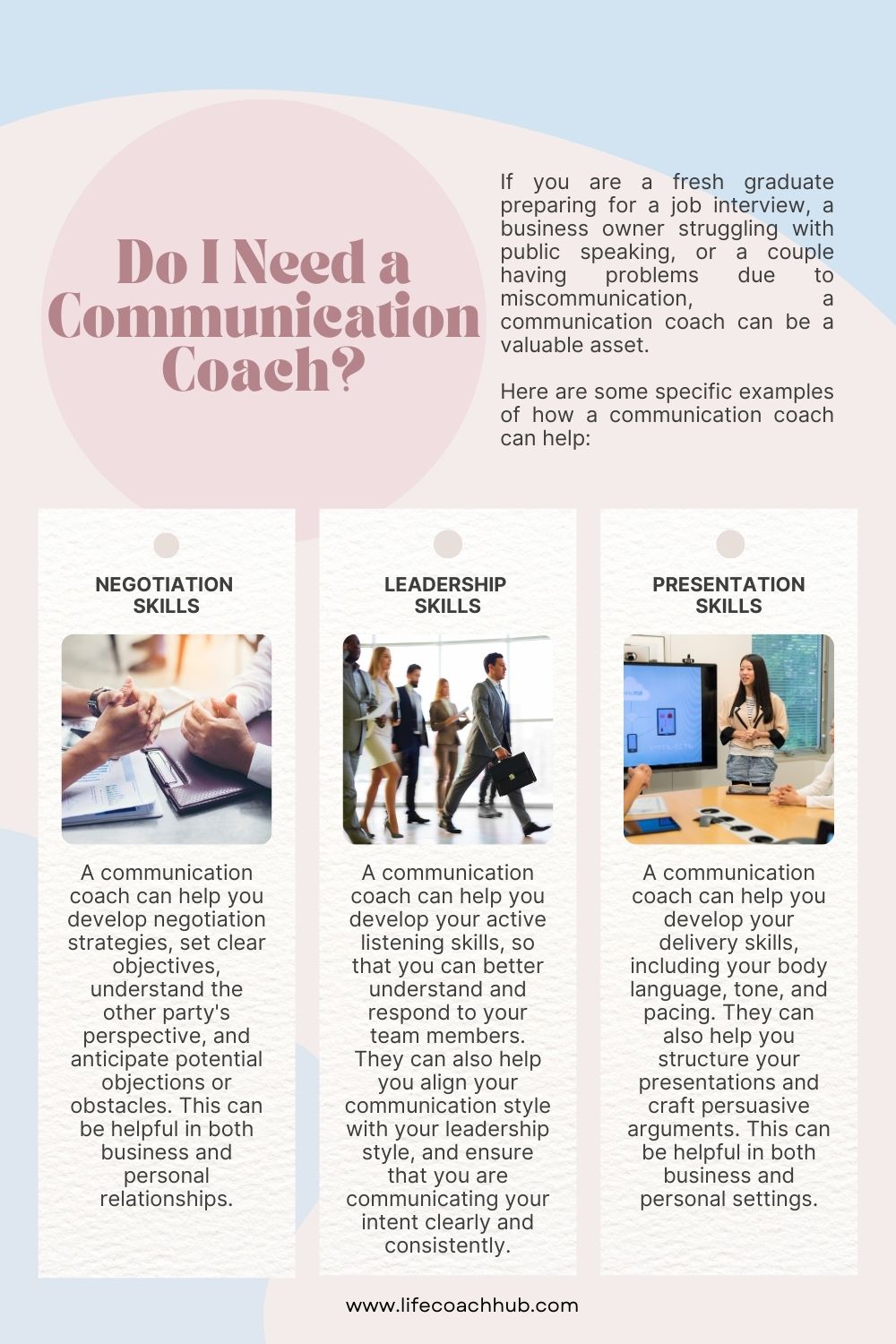
How often do you find yourself in situations where you say things you later regret?
As it happens, blurting out the wrong things comes to us easier than the right things do. Yes, yes. You did mean to be helpful. But how the other party receives it is the defining factor.
The intention is good. But the delivery? Not so much. In the end, you turn out to be hurtful than anything.
Now, the problem when you find yourself in these situations is that you can't unsay it anymore. You've dug your grave despite unintentional. You and your blunders must lie in it.
The moral? Think before you speak. It's only common sense, after all, to think carefully and to weigh the consequences of your words. This would be wise before you volunteer unsolicited advice, burst into anger, or spread rumors (Heyman, 2007).
If you want to avoid any of these (as any decent human being should), here are some of the ways a communication coach can help you:
Communication isn't just about what you say. It's also about how you say it. A coach can help you become more attuned to non-verbal cues. Body language. Facial expressions. Tone of voice. These cues can significantly impact how your message is received.
If you tend to avoid difficult conversations to prevent conflict, a communication coach can provide you with strategies. Those that will help you to navigate such discussions constructively. You must know that avoiding conflict altogether can only lead to pent-up emotions and unresolved issues.
In relation to this, fear of being misunderstood or misinterpreted can lead to communication anxiety. Your coach can teach you techniques to manage stress. Thus, enabling you to communicate more confidently.
Take this as an example. Imagine you're a manager at a company. You've noticed a recurring issue with a team member's performance. You've avoided discussing it with them because you fear that your feedback might be taken the wrong way.
It might even cause tension for everyone (involved or not). This kind of avoidance often creates a communication blind spot.
But by working with a communication coach, it’s possible to eliminate it. You’ll get to foster better communications. And there'll be a more constructive relationship within your team.
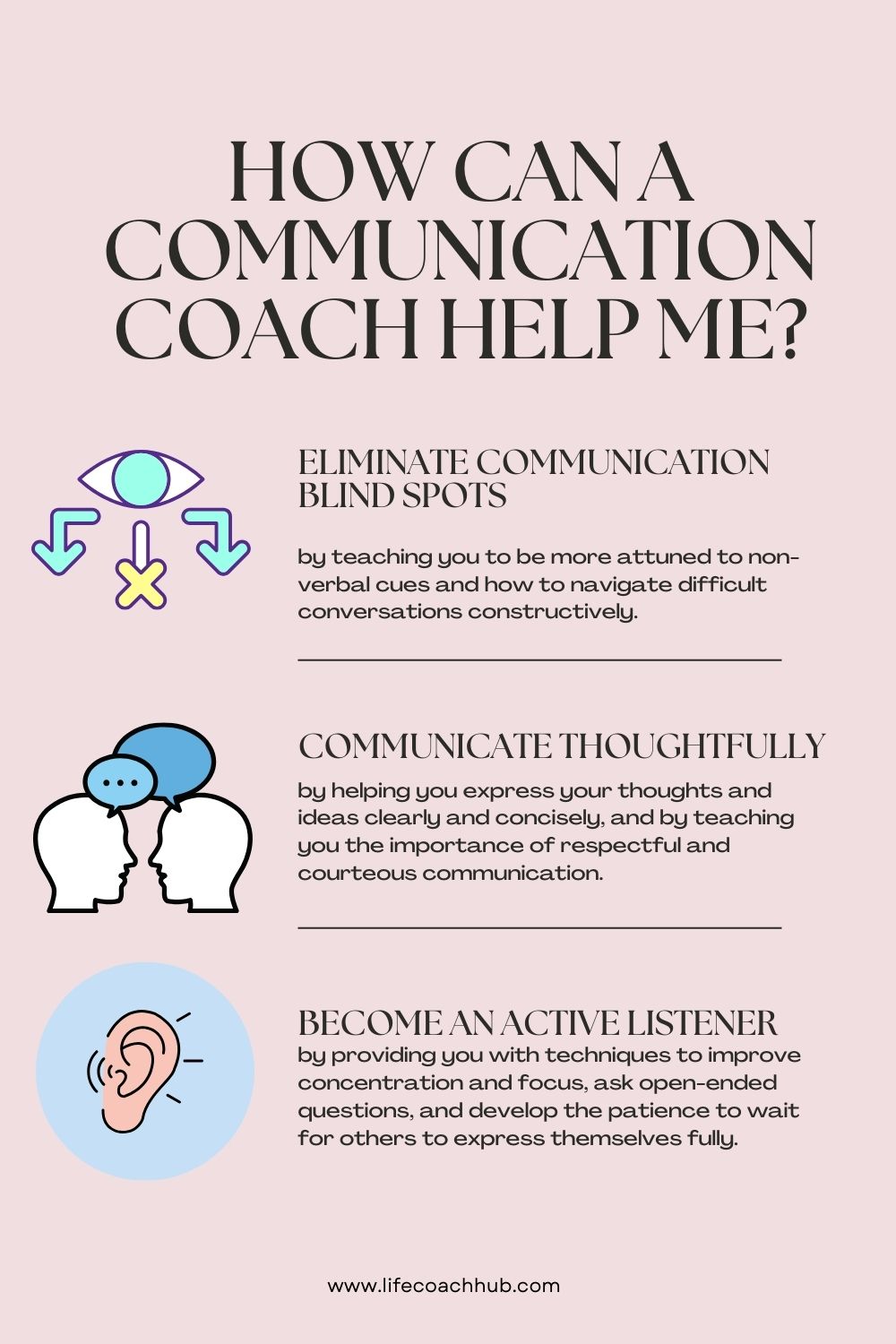
Miscommunication can lead to misunderstandings. At its worst, it can even lead to a tragic death. This isn't even an exaggeration. Does the famous Shakespearean play Romeo and Juliet ring a bell?
Misunderstandings can quickly escalate into much (much) worse things. A seemingly innocent misunderstanding can transform assurance into apprehension, consternation into comedy, and triviality into tragedy (Young, 2010).
More so, misunderstandings often arise from vague conversations. Embarking on communication skills coaching can help you express your thoughts and ideas. More clearly and concisely at that. Therefore, reducing the chances of confusion.
In addition, respectful and courteous communication is an essential component of thoughtfulness. It involves being polite. You use inclusive language. You avoid behaviors that might be considered disrespectful or offensive.
Now, thoughtful communication is an art. One that involves conveying your messages with care, empathy, and consideration for their impact. It's moving beyond simply giving information. Instead, you focus on understanding, building relationships, and promoting a positive atmosphere in your interactions.
But before achieving those two above, you must first learn active listening. Thoughtful communication starts with you being an active listener. You avoid communication blind spots if you manage to listen actively.
It's important that you understand how active listening is not merely hearing the words spoken by another. Fully comprehending the message is also a major part of it. And then there's the processing of that information too. This will allow you to respond thoughtfully.
Active listening is the element that prevents you from developing selective perception. This happens when you only see what you expect to see. As in, your rigid expectations of how others should behave get in the way of hearing what they're actually saying (Young, 2010).
Thus, mastering active listening is necessary. For it allows you to grasp the other's intentions. A communication coach can provide you with techniques to improve concentration and focus. You'll be able to avoid distractions so much better.
Through communication skills coaching, you'll also know how to ask open-ended questions. This way, you can encourage the other person to share more and clarify their thoughts. You'll even develop the patience to wait for others to express themselves fully.
Without interruptions. And yes, before responding.
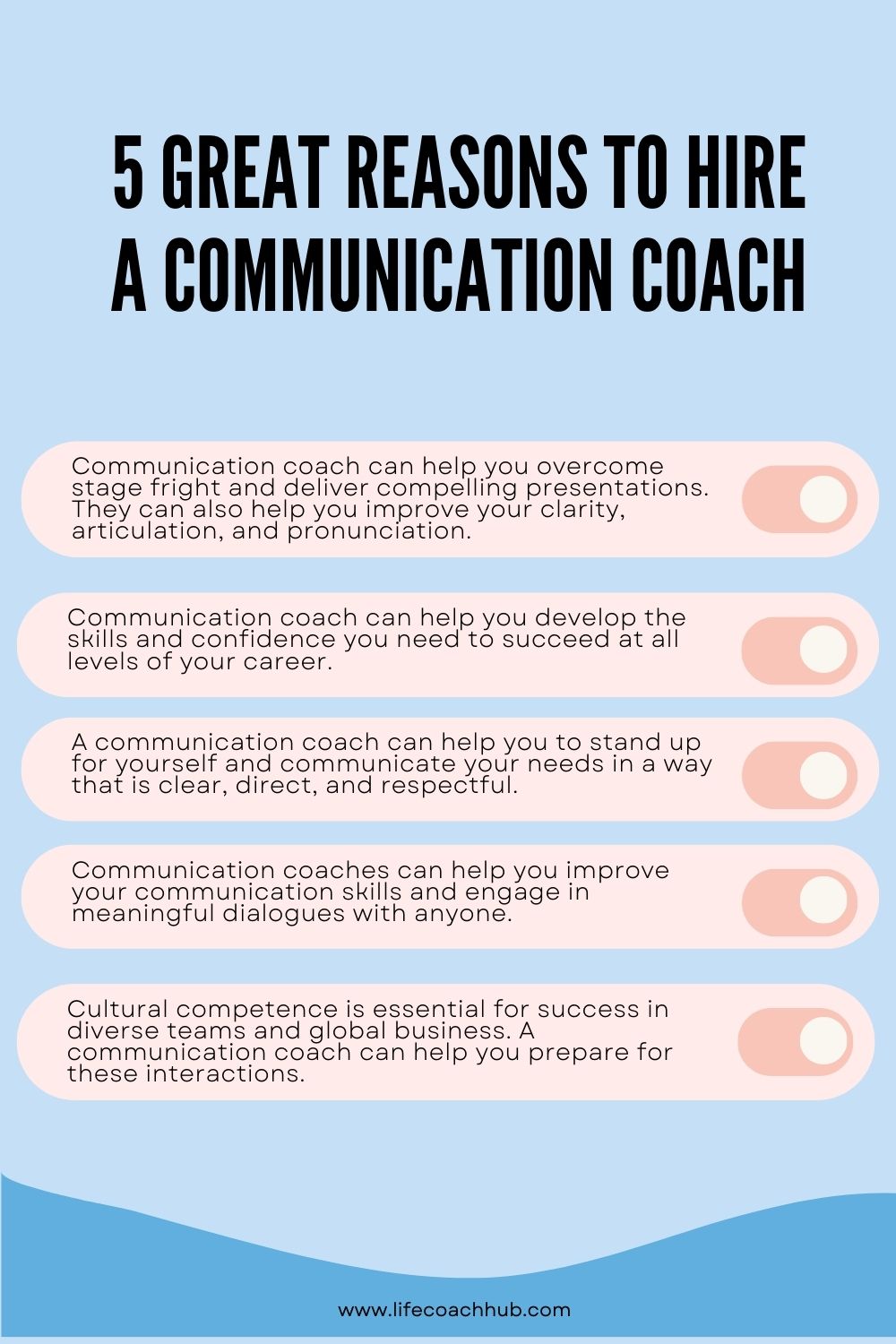
Communication is complicated, no surprise there. As simple as it should be, it always isn’t. Just in one conversation, about eight other communications are ongoing all at once (Nielsen, 2008)!
(1) What you mean to say. (2) What you actually say. (3) What the other person hears. (4) What the other person thought they heard. (5) What the other person means to say. (6) What they actually say. (7) What you hear from them. (8) What you think you heard from what they said.
This actually makes sense, right? Even if the conversation itself always doesn’t ?
Your inability to communicate in ways that truly work affects your relationships. To maintain the existing ones and to build new bonds. It’s exhausting and as if talking to someone speaking a different language if done ineffectively.
But as with any foreign language, it is learnable. Effective communication that is. And speak it fluently you can with the help of a communication coach.
Here are 5 great reasons on why you should hire one:
Public speaking can be nerve-wracking. Many individuals experience stage fright or performance anxiety when addressing large audiences. A communication coach can provide techniques to manage anxiety and build confidence.
This may also mean improving clarity and your articulation. Which, a communication coach can help you with. Together, you can refine your pronunciation and overall speech quality.
Or your situation perhaps involves delivering a compelling presentation. Conveying information isn’t enough. You also need to engage your audience.
Communication skills coaching can help you capture and maintain their attention. How? By infusing energy into your delivery. Using storytelling techniques and incorporating multimedia elements can aid you in this.
Of course, it won’t only be to one audience. You’ll also find yourself facing a different set of people. And if you are to become an effective communicator, you’ll need to adapt your communication style accordingly. Your coach can help you strike the balance between providing enough detail for beginners and not overwhelming experts.
A pivotal step in career advancement is acing job interviews. A communication coach can help you prepare effectively, build confidence, and refine your interview skills.
Circling back, networking is instrumental in career growth. A coach can teach you how to network strategically and make a lasting impression.
Say you're attending a high-profile industry event where influential professionals gather. Unfortunately, you find it challenging to initiate conversations. A communication coach can guide you in breaking the ice. You’ll know how to engage in meaningful conversations.
Let’s not forget that it also involves leadership roles. A communication coach can help you convey your vision and expectations to your team. With communication skills coaching, you’ll be able to set clear expectations and provide constructive feedback. You can also motivate your team towards shared goals.
Then there’s your overall executive presence which is vital at senior levels. Your coach can assist you in developing the gravitas, confidence, and communication style that exude leadership.
Confidence in asserting yourself is crucial in both personal and professional life. A coach can guide you in developing assertiveness without coming across as aggressive.
Because you would want to lean more on being assertive than aggressive. Why?
For one, assertiveness involves expressing your thoughts, feelings, needs, and boundaries. In a clear, honest, and respectful manner. It’s respectful even when you disagree with what another person is saying.
It’s problem-solving centric. You focus on finding solutions to issues and conflicts, rather than dwelling on blame or criticism.
Most of all, assertive individuals are confident in their own abilities and in their right to express themselves. There’s no intent to intimidate on your part just to get your way. You simply stand up for things that matter most to you.
All the while, respecting those that are important to others. It’s like looking after your own needs and interests and still recognizing other people’s own version (Luecke & Zimmerman, 2010). There’s a proper balance.
There’s nothing small about small talk. Especially in a social setting which can serve as a key to your professional or business success. Casual talks set the tone for the bigger conversations. When you suck at it, and many people do, well…it can be a turn off for the person you’re talking to (or impressing).
A communication coach can help you engage any person in meaningful dialogues. They can even teach you on how to resuscitate a dying conversation. Transitioning into other sets of topics will also come easy to you. Take note that it’s also best to start and end business conversations with small talk for you to humanize the relationship (Fine, 2005).
You can say goodbye to the awkwardness and anxiousness. And say hello to new business friendships. While others may be natural born-talkers, you can still excel at making small talk. Maybe even better at some point!
Cultural diversity is a reality in many workplaces and communities. Being culturally competent is not just a nice-to-have skill. It’s a necessity for effective communication.
Cultural competence goes beyond tolerance too. There’s the “understanding, respecting, and valuing the differences among individuals and groups” aspects. A communication coach can help you cultivate a mindset of inclusivity.
You can’t deny that stereotypes and biases can unintentionally creep into your interactions. Your coach can raise awareness about these biases. Together, you can challenge and overcome them.
Communicating across cultures is challenging due to differences in communication styles, norms, and expectations. Different cultures even have various norms related to communication, hierarchy, punctuality, and decision-making. Your coach can educate you on these norms to avoid unintended breaches. Your coach can also provide strategies and techniques for effective cross-cultural communication.
In diverse teams, understanding cultural nuances can enhance collaboration and productivity. In international business, cultural competence is critical for successful negotiations and partnerships. Your communication coach can prepare you for diverse and global interactions.
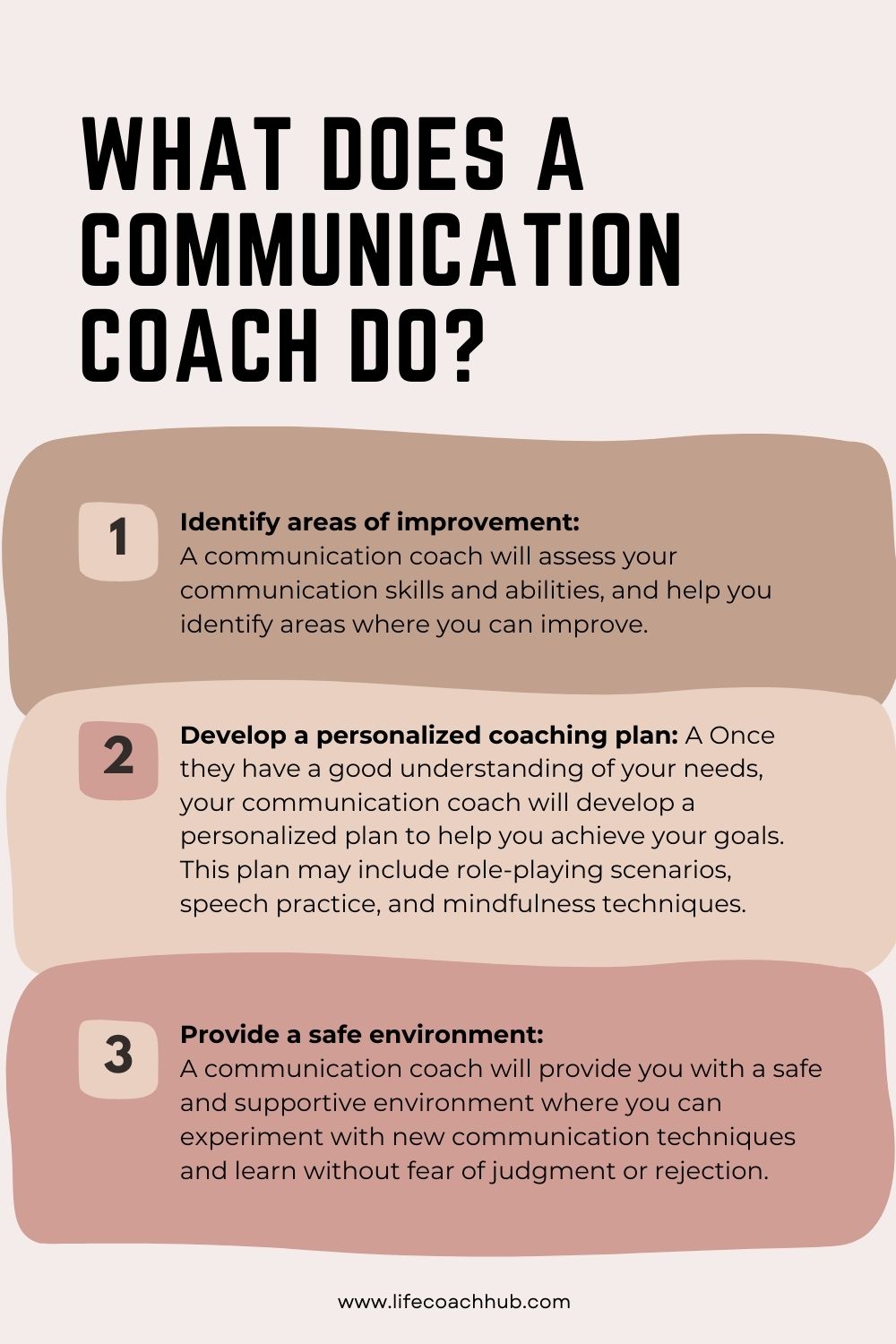
Communication skills coaching involves asking thoughtful and right questions. Your coach can better grasp your situation. What needs working on? What's your communication style and how to refine it? Some of the questions they'll ask you include the following:
Did that work? Are you convinced now? If so, then check out our list of professional communication coaches in the list above. We can also match you with the best one for your specific needs if you send us a coaching request form.
